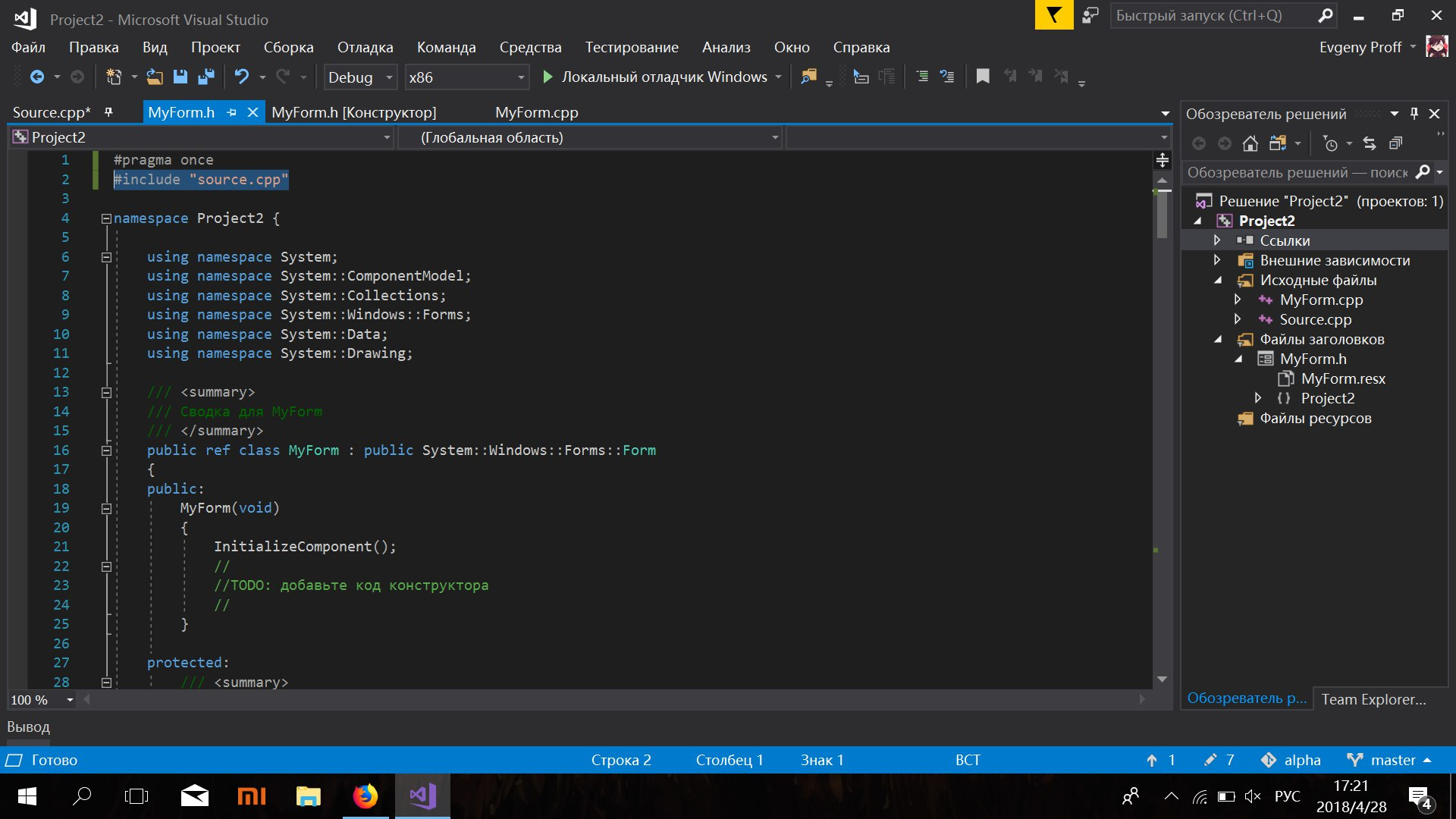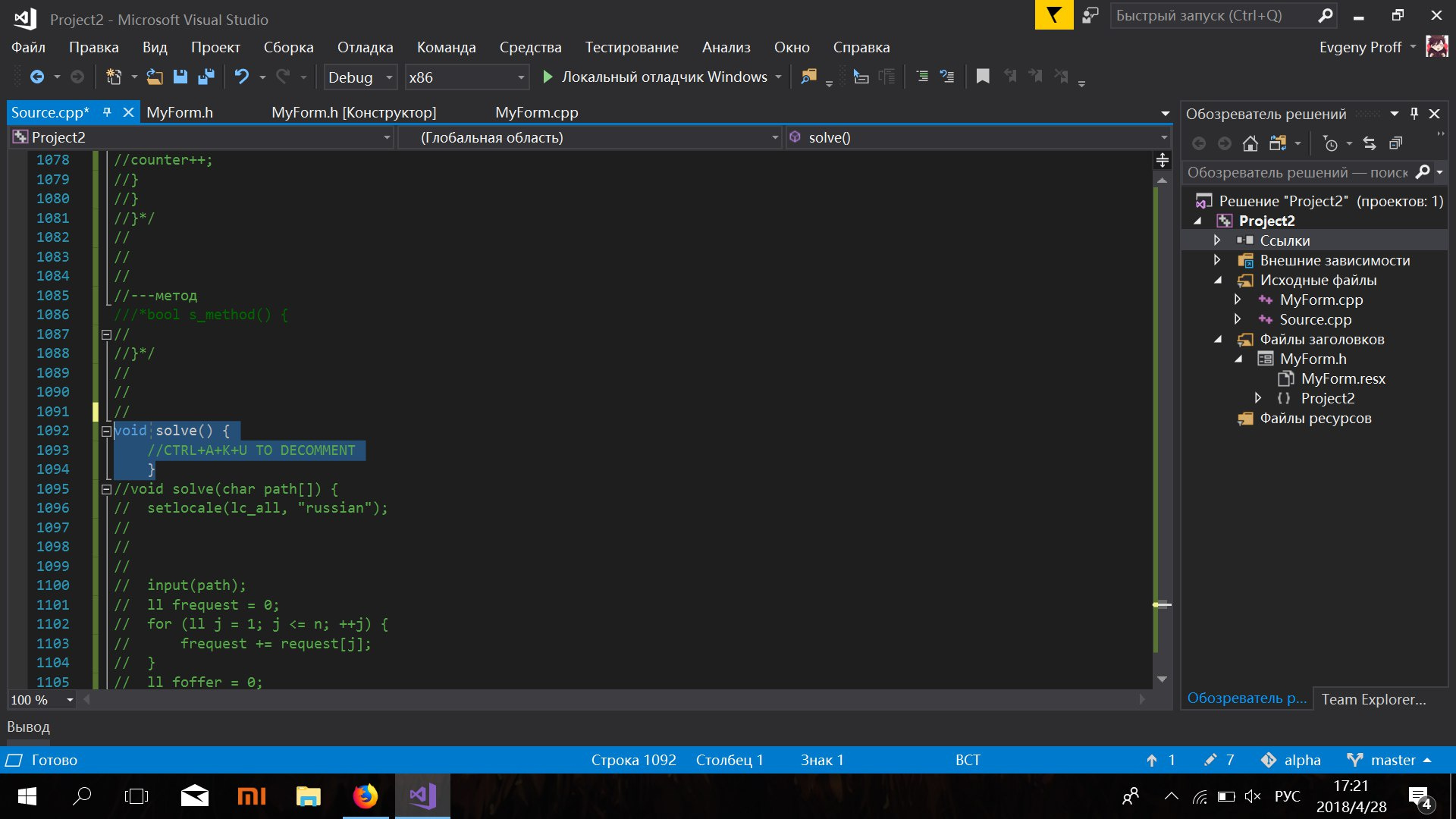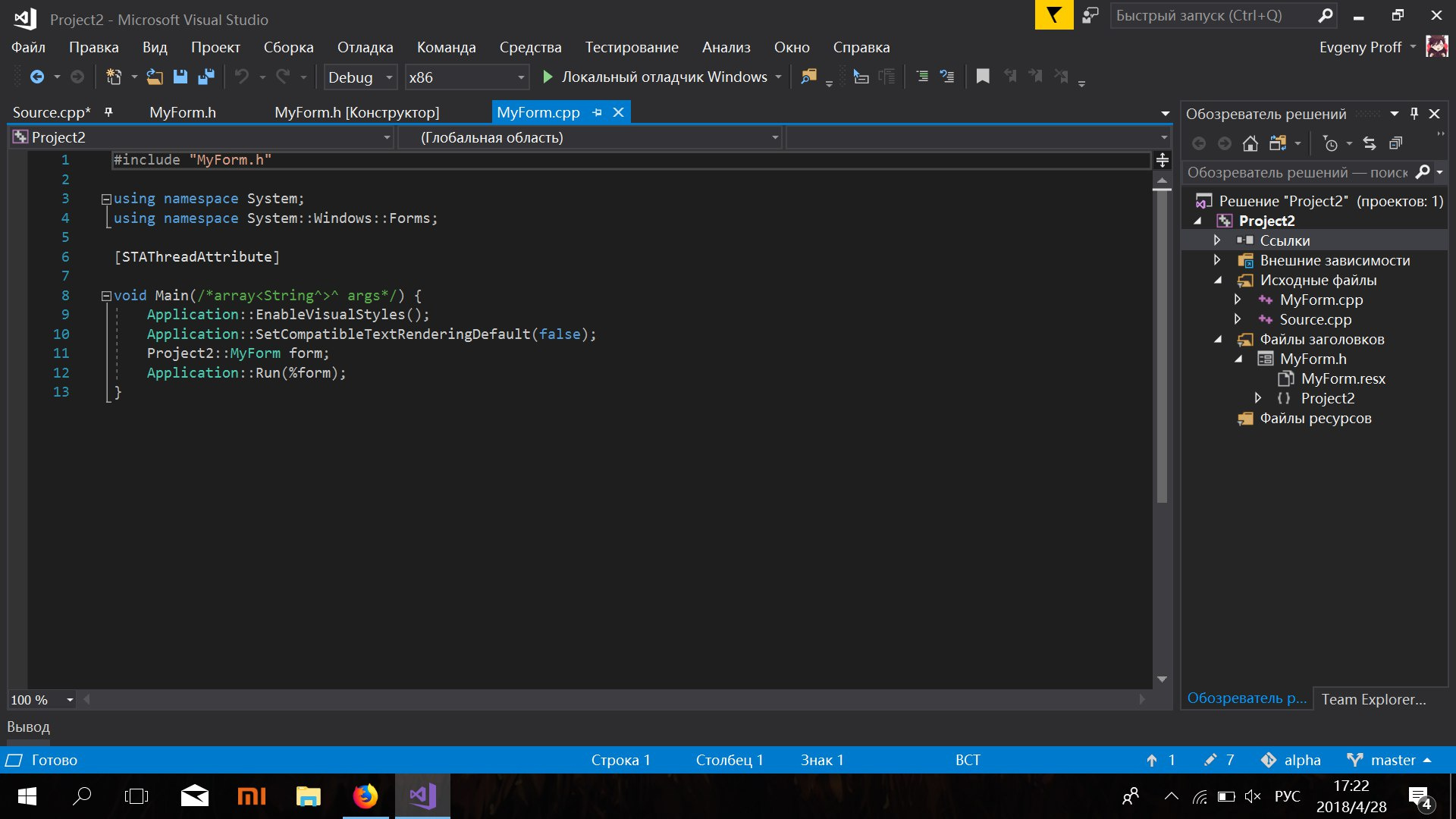Whiteha, include guard это те самые
| C | ||
|
Защищают от множественного включения одного файла. Если, например, сделать
| C | ||
|
И в этих хэдэрах подключается один и тот же заголовочныый файл, в котором не стоят инклуд гуарды, то собрать проект не выйдет.
Так что лучше их использовать всегда.
Директива #include просто подставляет содержимое файла. Так что сами представьте, что будет, если подставить содержимое одного файла дважды. Уж точно ничего хорошего
Сообщение от Whiteha
Насколько я помню расширение подключаемых файлов может быть хоть txt, тк препроцессор работает с текстовыми файлами, а какое им задать расширение это дело традиции
Совершенно верно. Однако, следует помнить, что иные способы могут вызвать кучу недоразумений и непониманий. Собственно отсюда и пошли традиции — чтобы все друг друга понимали.
Сообщение от Kuzia domovenok
Скажи, зачем мэйкфайлы человеку пытающемуся создать первый проект из двух файлов спп в MSVS? Инклуд стражи он уже использовал не там где надо.
То, что MSVS сама генерирует мэйкфайл или что-либо подобное не значит, что его нет или что этого человека можно обманывать, говоря о линкере как о всеумеющей тулзе. Это не так.
Не по теме:
Сообщение от Kuzia domovenok
Мне впадлу было.
Я так посмотрю с Вами часто такое.
Background
I have a project named PersonLibrary which has two files.
- Person.h
- Person.cpp
This library produces a static library file. Another project is TestProject which uses the PersonLibrary (Added though project dependencies in VS008). Everything worked fine until I added a non-member function to Person.h. Person.h looks like
class Person
{
public:
void SetName(const std::string name);
private:
std::string personName_;
};
void SetPersonName(Person& person,const std::string name)
{
person.SetName(name);
}
Person.cpp defines SetName function. When I try to use SetPersonName from TestProject, I get error LNK2005: already defined. Here is how I used it
#include "../PersonLibrary/Person.h"
int main(int argc, char* argv[])
{
Person person;
SetPersonName(person, "Bill");
return 0;
}
Workarounds tried
1 — I have removed the Person.cpp and defined the whole class in Person.h. Error gone and everything worked.
2 — Changed the SetPersonName modifier to static. Like the below
static void SetPersonName(Person& person,const std::string name)
{
person.SetName(name);
}
Questions
- Why the code shown first is not working as I expected?
- What difference static made here?
- What is the approapriate solution for this problem?
Thanks
asked Mar 7, 2009 at 18:05
Navaneeth K NNavaneeth K N
15.2k37 gold badges126 silver badges184 bronze badges
You either have to
- move
SetPersonName‘s definition to a .cpp file, compile and link to the resulting target - make
SetPersonNameinline
This is a well known case of One Definition Rule violation.
The static keyword makes the function’s linkage internal i.e. only available to the translation unit it is included in. This however is hiding the real problem. I’d suggest move the definition of the function to its own implementation file but keep the declaration in the header.
answered Mar 7, 2009 at 18:11
dirkgentlydirkgently
107k16 gold badges131 silver badges187 bronze badges
4
When you compile you’re library, its lib file contains a definition for SetPersonName. When you compile your program that uses the library, since it includes the header, and you’ve written the code inline in the header it also compiles in a definition for SetPersonName. Two definitions for the same function aren’t (generally) allowed. The static keyword tells the compiler that the function shouldn’t be exposed outside of the current translation unit (discrete piece of code you are compiling), so the definition in the library isn’t visible to the linker.
The appropriate solution to this problem depends on your goals. Header files with static function declarations is almost never what you want. From a design standpoint I would recommend getting rid of SetPersonName altogether, and just use Person::SetName.
However, failing that, I would implement it much like you’ve done for the rest of your functionality, declarations in the header, and implementation in the .cpp. Inline functions associated with a library will tend to diminish many of the advantages of using a library in the first place.
answered Mar 7, 2009 at 18:22
Logan CapaldoLogan Capaldo
39.4k5 gold badges63 silver badges78 bronze badges
By declaring the function static you are scoping it to the current translation unit, so in effect you have added a new SetPersonName function in your main file, and would be calling that not the one defined in the library.
The correct solution is to declare SetPersonName as extern in person.h and implement it in person.cpp
Person.h
extern void SetPersonName(Person& person,const std::string name);
Person.cpp
void SetPersonName(Person& person,const std::string name)
{
person.SetName(name);
}
answered Mar 7, 2009 at 18:12
Rob WalkerRob Walker
46.4k15 gold badges98 silver badges136 bronze badges
-
The function SetPersonName will be compiled into each objectfile that includes the Person.h file, thus making the linker seeing several functions and giving the error.
-
By writing static you state that the function will only be visible within a single objectfile. You will still get several functions in you binary but now you will not get the errors.
-
Try to write
inlinebefore the function likeinline void SetPersonName(Person& person,const std::string name) { person.SetName(name); }…because the function is pretty simple it is OK I think to have it as an inline. An inline will place the necessary code where the function is used, without actually creating a function to be called.
answered Mar 7, 2009 at 18:09
A solution would be to make that function a static method. That will stop the «already defined» errors.
answered Mar 7, 2009 at 18:18
GeoGeo
92.8k117 gold badges342 silver badges518 bronze badges
I had a similar situation as described clearly by @logan-capaldo above.
A CPP source file (myfile.cpp) contained a function MyFunction. When building, this got compiled into myfile.obj. But the main CPP file (main.cpp) also included myfile.cpp, so the function MyFunction was being included/compiled/linked twice, leading to the «LNK2005 already defined» error.
This is messy but I didn’t have time to fix it properly. The quickest fix (in VS Express 2012) was to right-click myfile.cpp in Solution Explorer, go to Properties and change Excluded From Build to Yes. I guess this prevents one of the OBJ files from being created and/or linked and so removes the error.
answered Jan 27, 2016 at 16:22
PaulPaul
6598 silver badges9 bronze badges
For anyone landing here dealing with this error in a Qt project, make sure you don’t have any non-signal functions defined under signals: in your header files.
Incorrect, throws LNK2005 on Foo::promiseData():
class Foo : public QObject {
Q_OBJECT
public:
explicit Foo(QObject* parent = nullptr);
signals:
void dataReady(QList<QObject*> data) const;
void promiseData() const; // <-- This function is not supposed to be a signal.
Correct:
class Foo : public QObject {
Q_OBJECT
public:
explicit Foo(QObject* parent = nullptr);
void promiseData() const;
signals:
void dataReady(QList<QObject*> data) const;
answered Sep 13, 2019 at 21:18
If you want both to reference the same variable, one of them should have int k;, and the other should have extern int k;
For this situation, you typically put the definition (int k;) in one .cpp file, and put the declaration (extern int k;) in a header, to be included wherever you need access to that variable.
If you want each k to be a separate variable that just happen to have the same name, you can either mark them as static, like: static int k; (in all files, or at least all but one file). Alternatively, you can us an anonymous namespace:
namespace {
int k;
};
Again, in all but at most one of the files.
In C, the compiler generally isn’t quite so picky about this. Specifically, C has a concept of a «tentative definition», so if you have something like int k; twice (in either the same or separate source files) each will be treated as a tentative definition, and there won’t be a conflict between them. This can be a bit confusing, however, because you still can’t have two definitions that both include initializers—a definition with an initializer is always a full definition, not a tentative definition. In other words, int k = 1; appearing twice would be an error, but int k; in one place and int k = 1; in another would not. In this case, the int k; would be treated as a tentative definition and the int k = 1; as a definition (and both refer to the same variable).
Привет!
Возникла проблема в VS 2017 с ошибкой линкования файлов (LNK2005), прикреплю скриншоты для наглядности.
В проекте 3 файла:
- MyForm.h — файл самой формы C++CLI, здесь я делаю #include «source.cpp», что скорее всего и падает, также здесь использую методы взаимодействия с формой типа openFileDialog и т.д.
spoiler
- Source.cpp — основной скрипт на 1.3к строк, мне нужно в MyForm.h вызвать вызвать функцию void solve() {…}, которая работает только в пределах стандартных библиотек и самого Source.cpp, не вызывая ничего «изнутри», для простоты все закомментировал и во всем файле оставил:
void solve() { // }spoiler
- MyForm.cpp — нужен только для определения точки входа в приложение, там ничего не происходит.
spoiler
Возможно напутал с пространством имен или подключением, но если создать заголовок H1.h, где написать:
#include "source.cpp"
void solve();
— тоже не рабит(
В гугле нашел информацию про переопределение в нескольких файлах одной и той же функции, но у меня всего 1 файл с определением и подключаю его всего 1 раз;
Если мысль, что ошибка из-за того, что подключаю как-то так: Source.cpp -> MyForm.h -> MyForm.cpp…
Подскажите, как правильно!
|
|
|
|
Правила раздела Visual C++ / MFC / WTL (далее Раздела)
error LNK2005, исправление.
, Якобы уже определен класс
- Подписаться на тему
- Сообщить другу
- Скачать/распечатать тему
|
|
|
|
В Visual C++ 6 необходимо разбить программу на ООП на файлы, так, чтобы один файл (*.h) содержал сам класс, аналогичный *.cpp файл содержал функции этого класса. Kursach.obj : error LNK2005: «public: __thiscall Chelovek::Chelovek(char *,char *,char *)» (??0Chelovek@@QAE@PAD00@Z) already defined in Chelovek.obj Kursach.obj : error LNK2005: «public: __thiscall Chelovek::Chelovek(char *)» (??0Chelovek@@QAE@PAD@Z) already defined in Chelovek.obj Kursach.obj : error LNK2005: «public: __thiscall Chelovek::Chelovek(void)» (??0Chelovek@@QAE@XZ) already defined in Chelovek.obj При это, есть файл Chelovek.h с таким содержанием: #ifndef CHELOVEK_H #define CHELOVEK_H #include <fstream.h> class Chelovek { protected: char Name[15]; char Family[15]; char Otchestvo[15]; public: int ID; Chelovek(char *Nm,char *Fm,char *Ot); Chelovek(char *Fm); Chelovek(); ~Chelovek(){}; virtual void print()= 0;// Чистая виртуальная функция virtual int fwrite()= 0; virtual int Fwrite(fstream f)= 0;// Чистая виртуальная функция virtual int fread()=0;// Чистая виртуальная функция virtual int Fread(ifstream f)= 0; }; #endif А файл Chelovek.cpp имеет такое содержание: #include «Chelovek.h» #include <string.h> Chelovek::Chelovek(char *Nm,char *Fm,char *Ot) { ID=0; strcpy(Name,Nm); strcpy(Family,Fm); strcpy(Otchestvo,Ot); } Chelovek::Chelovek(char *Fm) { ID=0; strcpy(Family,Fm); } Chelovek::Chelovek() { char *y; y=»»; ID=0; strcpy(Name,y); strcpy(Family,y); strcpy(Otchestvo,y); }
А в основном файле просто инклудится Chelovek.cpp. Заранее всем спасибо. Сообщение отредактировано: антиКИЛЛЕР — 21.06.08, 13:39 |
|
Juni |
|
|
// h class Chelovek //cpp Chelovek::Chelovek(char *Fm) Chelovek::Chelovek() попробуй Сообщение отредактировано: Juni — 21.06.08, 13:54 |
|
антиКИЛЛЕР |
|
|
Juni, f:институткурсовая тех прогkursachchelovek.h(17) : error C2653: ‘std’ : is not a class or namespace name f:институткурсовая тех прогkursachchelovek.h(19) : error C2653: ‘std’ : is not a class or namespace name F:ИНСТИТУТКурсовая Тех прогKursachKursach.cpp(173) : error C2248: ‘Name’ : cannot access private member declared in class ‘Chelovek’ f:институткурсовая тех прогkursachchelovek.h(6) : see declaration of ‘Name’ Далее список ошибок приводить не буду, т.к. они относятся к тому, что программа не может получить доступ к данным private. В случае, если просто убрать такие строки: #ifndef CHELOVEK_H #define CHELOVEK_H … #endif то возникает ошибка открытия файла Chelovek.obj: LINK : fatal error LNK1104: cannot open file «.DebugChelovek.obj» Error executing link.exe. |
|
антиКИЛЛЕР |
|
|
По ходу компилятор переглючил. Сейчас запустил и теперь уже находится Chelovek.obj и возникают те же самые ошибки error LNK2005. |
|
Hryak |
|
|
Цитата антиКИЛЛЕР @ 21.06.08, 13:38 А в основном файле просто инклудится Chelovek.cpp.
Проблема в том, что ты инклудишь .cpp-файл. Так не делается. |
|
антиКИЛЛЕР |
|
|
Hryak, |
0 пользователей читают эту тему (0 гостей и 0 скрытых пользователей)
0 пользователей:
- Предыдущая тема
- Visual C++ / MFC / WTL
- Следующая тема
[ Script execution time: 0,0310 ] [ 16 queries used ] [ Generated: 29.05.23, 10:34 GMT ]












